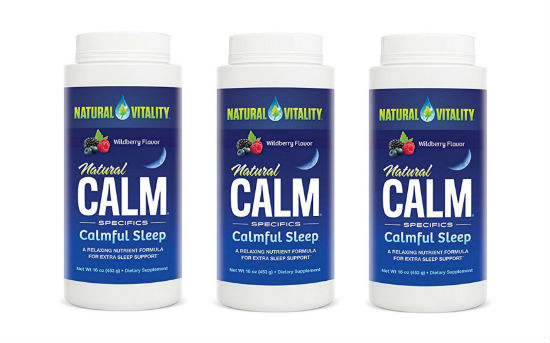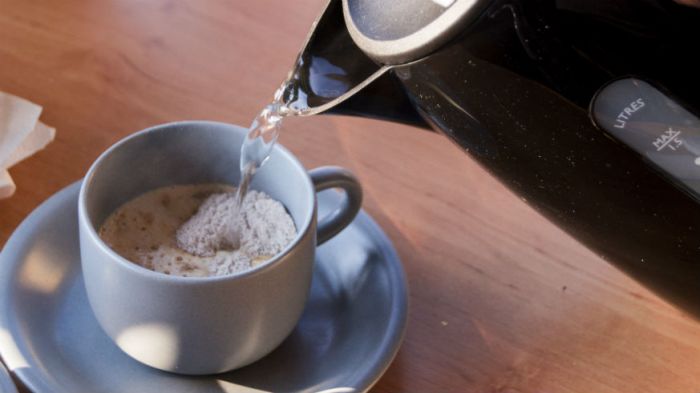Does magnesium help you sleep? I mean really, truly help you sleep?
If you have an Instagram or Facebook account, you’ve seen the posts about magnesium powders and people praising their power to lull even the worst insomniac into a night of restful sleep. But does it actually work for the average person? And, more importantly, is there any science behind this, or is it just the power of wishful thinking that helps these brand devotees sleep so soundly?
Metro US looked into the science behind these claims, but then put it to the test to see if it would actually work on someone with an anxious mind. Here’s how both of those factors break down.
Does magnesium help you sleep? What science says…
This one’s a resounding yes. Does magnesium help you sleep? Yes, but you need to make sure you’re getting the right type. Most of the magnesium supplements out there list a formula that includes the form magnesium citrate or magnesium carbonate, but these aren’t ideal if the main benefit you’re looking to get from adding the supplement to your regimen is better sleep.
“Magnesium citrate and carbonate are more likely to produce a laxative effect,” Parsely Health nutritionist Adrienne Dowd, RD told Well + Good. The form she suggests for those truly restful zzzs: magnesium glycinate.
That’s not to say that this is the only form of magnesium that has health benefits. Different forms of magnesium have been connected to health benefits ranging from keeping bones strong and preventing bone fractures to helping to prevent some types of cancer. So if you’re already popping a magnesium supplement, don’t throw it out just because the back of the bottle doesn’t say magnesium glycinate.
Does magnesium help you sleep? Here’s what it did for me…
Did magnesium help me sleep? Actually, yes. I have to admit that I was pretty doubtful. Even if the science said it would work for the average person, my mind is active and anxious enough at night that I presumed I’d be the exception to the rule.
After doing my research on the different types of magnesium and magnesium supplements on the market, I finally found one that had the exact type of magnesium for which I was looking: Natural Vitality Natural Calm. NOTE: There are plenty of magnesium supplements and powders on the market that boast the same type of magnesium and potential restful sleep benefits, this brand has been promoted on my social media feeds a lot, so I was curious to see if this one specifically was worth all the hype it was getting.

The Natural Vitality product that’s getting most of the credit online is actually a different magnesium powder, called Calm Powder. The difference is a big one. The Calm Powder has magnesium citrate, not glycinate.
I took the risk and added the extra large tub of Natural Calm to my cart, and I’m glad I did. I got 16 ounces for $32.99, and with over 100 servings per container, I’m confident I won’t have to worry about ordering more for a long, long time.
How do you take magnesium for sleep?
Although products differ in forms, Natural Calm is a powder that you turn into a soothing warm drink in a couple seconds. All I need to do is add 2 teaspoons of the powder to a small amount of hot water and stir if there’s anything that needs to dissolve. Usually this is unnecessary as pouring the hot water into my mug is enough to dissolve the couple spoonfuls of powder I put in. Then I simply add warm water to taste. I’ll add more water and hotter water if I want to sip on a soothing hot drink for a while before bed, or a smaller amount of room temperature water if I want to drink it quickly and hit the hay.
The taste is true to flavor: wild berry. There’s a slight chalky flavor to it, kind of like what you get with classic Tums, but I don’t mind the mild aftertaste. Maybe it’s because I was somewhat obsessed with Flintstones Vitamins as a kid, but there’s something comforting about it. You could probably steep an herbal tea bag in the water you add to the powder to soften the chalk flavor if it’s something you really want to cover up, although I have yet to try this idea.
Are there other supplements for sleep?
Does magnesium help you sleep? Yes, but that’s not the only sleep supplement out there, and not the only one in this powder, either. The Natural Vitality Natural Calm includes two more of them: melatonin and GABA.
Melatonin is a hormone our bodies produce naturally from a tiny gland in the brain called the pineal gland, and it regulates our sleep and wake cycles. Peruse any vitamin aisle in any drug store, and you’ll see everything from combinations that include the hormone to tiny pills of just melatonin.
GABA is a feel-good supplement that’s credited not directly with helping you fall asleep but rather with easing anxiety, which can help calm your frantic mind. And we all know that sometimes it’s those anxious thoughts, not lack of sleepiness, that keeps you up at night. GABA is actually a neurotransmitter that inhibits your nervous system excitability. Translation: It helps with relaxation.
Though you’ll frequently see high doses of GABA in supplements, the effect this ingredient has is minimal since oral versions have difficulty crossing the blood-brain barrier and, therefore, being put to use by your body. So you don’t have to worry about getting too powerful of a punch.
Are there side effects to taking magnesium for sleep?
Depending on who you listen to, melatonin is either a horrible supplement you should never touch or a gift from the sleep gods. Since melatonin is found naturally in some foods, the FDA does not oversee or ban the production of melatonin supplements. Critics of OTC melatonin supplements say that taking the hormone in pill form can disrupt your natural sleep cycles.
But what does the research say? “Some studies show promise for the use of melatonin in shortening the time it takes to fall asleep and reducing the number of awakenings,” according to the National Sleep Foundation. Although they point out that the supplement does not necessarily help improve the total time you spend asleep.
Some critics also point out that a typical dose of the sleep hormone (anywhere from 1 to 5 mg) has the potential to “elevate your blood melatonin levels to 1 to 20 times normal” the National Sleep Foundation cautions, but Mayo Clinic deems it safe for short-term use.
In fact, though melatonin comes with some of the same potential side-effects as other sleep aids such as drowsiness, headache, dizziness and nausea, the Mayo Clinic says the risk of getting these side effects with melatonin use is far lower than other OTC products. They also highlight that unlike other sleep aids, you’re unlikely to become dependent on melatonin.
I, personally, haven’t had any side effects with the powdered magnesium supplement I’m taking. Although the directions allow a slow increase up to 2 teaspoons, I’ve been keeping my dose to 1 teaspoon and only use the powder roughly twice a week.





















